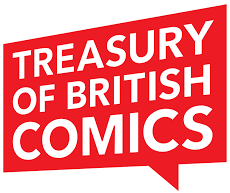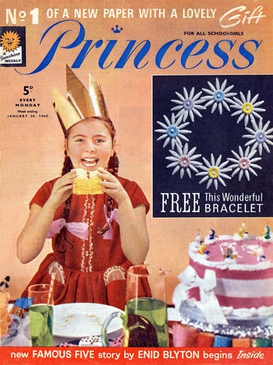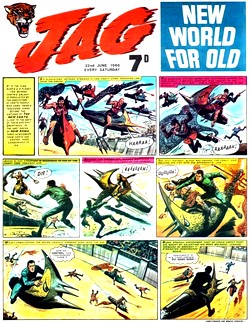Joseph Leo Baxendale was an English cartoonist and publisher. Baxendale wrote and drew several titles. Among his best-known creations are the Beano strips Little Plum, Minnie the Minx, The Bash Street Kids, and The Three Bears.

Tiger was a weekly British comics periodical published by Amalgamated Press, Fleetway Publications and IPC Magazines from 11 September 1954 to 30 March 1985. The title was initially launched in a large tabloid size to mimic newspapers; while it featured some action-adventure stories Tiger contained a large number of sport strips. The most famous of these was "Roy of the Rovers", which debuted in the first issue and was the comic's most popular feature, eventually transferring to its own comic in 1975. Tiger would go on to become one of the company's longest-running titles, with 1,573 issues published before being merged with Eagle in 1985. Over the course of its run, Tiger featured columns by numerous famous sports figures, including Ian Botham, Geoff Boycott, Tony Greig, Trevor Francis and Charlie Nicholas.
The Amalgamated Press (AP) was a British newspaper and magazine publishing company founded by journalist and entrepreneur Alfred Harmsworth (1865–1922) in 1901, gathering his many publishing ventures together under one banner. At one point the largest publishing company in the world, AP employed writers such as Arthur Mee, John Alexander Hammerton, Edwy Searles Brooks, and Charles Hamilton. Its subsidiary, the Educational Book Company, published The Harmsworth Self-Educator, The Children's Encyclopædia, and Harmsworth's Universal Encyclopaedia. The company's newspapers included the Daily Mail, the Daily Mirror, The Evening News, The Observer, and The Times. At its height, AP published over 70 magazines and operated three large printing works and paper mills in South London.

Amateur Gardening is a British fornightly magazine dedicated to gardening. It included news, advice, feature articles, and celebrity columns and interviews.

Lion was a weekly British comics periodical published by Amalgamated Press from 23 February 1952 to 18 May 1974. A boys' adventure comic, Lion was originally designed to compete with Eagle, the popular weekly comic published by Hulton Press that had introduced Dan Dare. It debuted numerous memorable characters, including Captain Condor, Robot Archie, Paddy Payne and the Spider. Lion lasted for 1,156 issues before being merged with stablemate Valiant.
Fleetway Publications was a magazine publishing company based in London.
The Egmont Group is a Danish media corporation founded and rooted in Copenhagen, Denmark. The business area of Egmont has traditionally been magazine publishing, but has over the years evolved to comprise mass media generally.

Wham! was a weekly British comics magazine published by Odhams Press. It ran for 187 issues from 20 June 1964 to 13 January 1968, when it merged into its sister title Pow!

Smash! was a weekly British comic book, published initially by Odhams Press and subsequently by IPC Magazines, from 5 February 1966 to 3 April 1971. After 257 issues it merged into Valiant.

Power Comics was an imprint of the British comics publisher Odhams Press that was particularly notable for its use of material reprinted from American Marvel Comics. Appearing chiefly during the years 1967 and 1968, the Power Comics line consisted of five weekly titles: Wham!, Smash!, Pow!, Fantastic and Terrific. The first three of these titles were essentially traditional The Beano-style British comics papers, supplemented by a small amount of Marvel and DC Comics material, while Fantastic and Terrific were more magazine-like in style and were dominated by their Marvel superhero content.

Odhams Press was a British publishing company, operating from 1920 to 1968. Originally a magazine publisher, Odhams later expanded into book publishing and then children's comics. The company was acquired by Fleetway Publications in 1961 and then IPC Magazines in 1963. In its final incarnation, Odhams was known for its Power Comics line of titles, notable for publishing reprints of American Marvel Comics superheroes.
Robin was a British weekly children's magazine published from 1953 to 1969, originally by Hulton Press. Robin was billed as "companion to Eagle, Girl, and Swift" and aimed at younger readers and pre-readers.

Treasury of British Comics is a line of comic book collections published by Rebellion Developments, collecting British comics stories from the libraries of Amalgamated Press/Fleetway Publications/IPC Magazines.

George Newnes Ltd is a British publisher. The company was founded in 1891 by George Newnes (1851–1910), considered a founding father of popular journalism. Newnes published such magazines and periodicals as Tit-Bits, The Wide World Magazine, The Captain, The Strand Magazine, The Grand Magazine, John O'London's Weekly, Sunny Stories for Little Folk, Woman's Own, and the "Practical" line of magazines overseen by editor Frederick J. Camm. Long after the founder's death, Newnes was known for publishing ground-breaking consumer magazines such as Nova.
City Magazines was a British publisher of weekly comics and men's magazines that operated from the mid-1950s to the mid-1970s. The company's most notable publications were comics magazines based on licensed television properties, including TV Century 21 and Lady Penelope, both of which featured comics based on Gerry Anderson's Century 21 Productions Supermarionation shows.
British girls' comics flourished in the United Kingdom from the 1950s through the 1970s, before beginning to decline in popularity in the 1980s and 1990s. Publishers known for their girls' comics included DC Thomson and Fleetway/IPC. Most titles appeared weekly, with the content primarily in picture-story format. The majority of the stories were serialized, with two or three pages per issue, over eight to twelve issues. They were marketed toward young teen girls.

Princess was a British weekly girls' comic anthology published by Fleetway Publications and, later, IPC Magazines. The first version was published between 30 January 1960 and 16 September 1967, and featured a mix of comic strips, text stories and a large proportion of features; it was merged with Tina to form a new title - Princess Tina - after 399 issues.
C. Arthur Pearson Ltd. was a British publisher of newspapers, periodicals, books, and comics that operated from 1890 to c. 1965. The company was founded by C. Arthur Pearson, later to be known as Sir Arthur Pearson, 1st Baronet.

Jag was a weekly British comics periodical published by Fleetway Publications and IPC Magazines from 4 May 1968 to 29 March 1969. A boys' adventure comic, the title lasted for 48 editions before being merged with another title, the long-established Tiger.

"The Indestructible Man" is a British comic strip published by Fleetway Publications and later IPC Magazines in the boys' comic anthology title Jag between 4 May 1968 to 29 March 1969. Written by Scott Goodall and drawn by Jesús Blasco, the story followed an Ancient Egyptian warrior who survived into the present day after learning a number of skills while entombed, and took on the identity of crime-fighter Mark Dangerfield.













